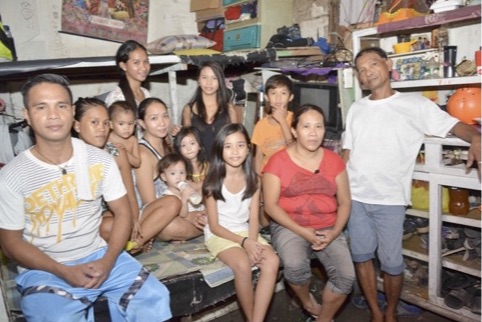Population and Development Week: Nov. 23 to 29
Citing the spread of the coronavirus disease 2019 (COVID-19) due to overcrowding in households and communities, the Commission on Population and Development (POPCOM) will highlight the interconnection of population factors and the pandemic during the observance of Population and Development (POPDEV) Week from Nov. 23 to 29.
As observed from trends and patterns of COVID-19 infections in the country, community transmissions are still pervasive in cities with close congregations of people.
Physical distancing—a critical health and safety protocol being implemented by the government—has proven to be difficult to implement among households of small residential units with an average of less than 20 sq. m., and having more than four members.
Mortality statistics due to COVID-19 have so far been skewed toward the elderly, especially those with comorbidities. Latest data from the World Health Organization reveal that 61.8% of total deaths due to the contagion have been recorded for persons 60 years of age and older.
RESILIENCY
POPCOM is calling on all government stakeholders and the public to address prevailing issues that affect the integrity of populations and communities.
For one, practicing family planning and responsible parenthood should be part of medium- to long-term solutions toward building the resiliency of families and communities, as these would enable couples to have greater capacity to ensure their health, financial stability, and other social protections in the future.
”Our resiliency against the pandemic and other related crisis situations starts from our decision to form a family,” Undersecretary Juan Antonio Perez III, MD, MPH, the executive director of POPCOM, emphasized. “We need to consider our preparedness and capabilities to provide each member their physical, social, emotional, and other pertinent needs.”
Perez added: ”When families are planned well, vulnerabilities diminish; thus, communities can overcome major disasters such as pandemics and natural calamities.”
As the central government agency for the country’s population management program, POPCOM also provides technical assistance to local government units (LGUs) and other institutions in addressing other population issues, such as unmanaged internal migration which causes congestion and crowding in megacities.
POPCOM believes initiatives that take into consideration population factors are relevant, particularly during the COVID-19 health crisis and the occurrence of recent natural disasters, as they will help local governments plan and implement their programs, with focus on communities with demographic vulnerabilities.
Perez said that given the government’s limited resources, “the importance of understanding and considering the demographic situation of populations in formulating development initiatives that aim to uplift lives of people and their communities, especially at this time of the pandemic and the series of natural calamities, cannot be underestimated.”
POPDEV INITIATIVE
Perez, who is also the undersecretary for population and development, is calling on local authorities to factor-in population variables in implementing their policies, programs and solutions—more so in the time of COVID-19 and the so-called “new normal”
“This is important, so that many can benefit from and appreciate the value of POPDEV, which will enable Filipinos to rise above adversities they are facing, and still reach their full potential as productive citizens,” he said.
An instance of a significant POPDEV initiative is the current use of the Demographic Vulnerabilities Tool, or DVT, of POPCOM, which LGUs throughout the country reference.
Available via www.popcom.gov.ph since April 2020, the DVT has been indispensable to local chief executives and community leaders in generating information on physical distancing, targeted contact tracing, as well as locating seniors with COVID-19 comorbidities.
This year’s POPDEV Week also seeks to raise awareness on the Philippines’ reproductive health situation and other demographic concerns adversely affected by the pandemic.
It likewise aims to increase collaboration among advocates and other stakeholders for family planning, as well as adolescent health and demographic interventions, while strengthening service delivery for their beneficiaries.
NATIONWIDE ACTIVITIES
To discuss the topic in detail, POPCOM’s Central Office will devote a special episode on POPDEV for its “Usap Tayo sa FP with Doc Jeepy” on Nov. 30, Monday, through its Facebook accounts @OfficialPOPCOM and @UsapTayoSaFP.
Social-media campaigns with the hashtags #KilosKontraPandemya and #DoonPoSaAmin will also encourage Filipinos to share their LGUs’ activities in combatting the pandemic while uplifting the lives of their respective communities, as well as their own contributions in addressing demographic vulnerabilities.
POPCOM, through its 17 regional offices, will also engage partner-agencies and LGUs to intensify localization efforts for PPMP, highlighting the need for strategic responses and sustainability efforts through memoranda of agreements.
They will also conduct summits, webinars and orientations as well as press engagements on demographic vulnerabilities.
POPDEV Week is an annual observance toward the latter part of November enacted via Proclamation No. 76, which was signed on Oct. 20, 1992 by then-president Fidel V. Ramos.
It highlights the need for invigorated and intensified campaigns in addressing concerns on Philippine population growth, as well as the country’s capacity to provide for a growing nation. Also, it emphasizes interrelationships of population issues and various sectors involved in development to raise awareness and appreciation, while drawing policy and program responses from stakeholders on POPDEV matters.


